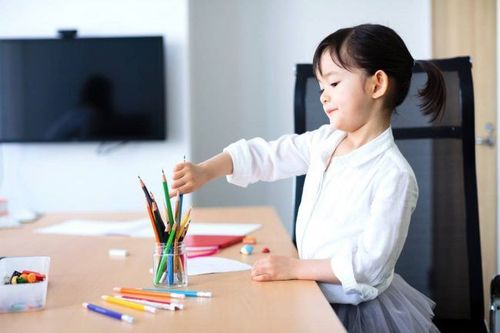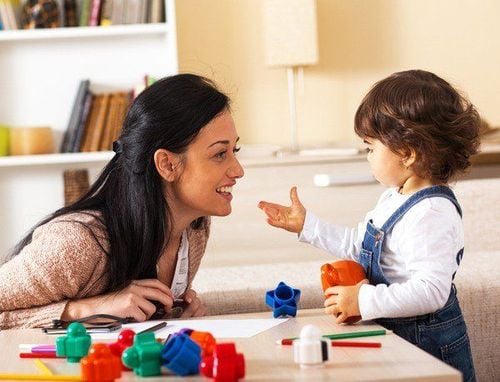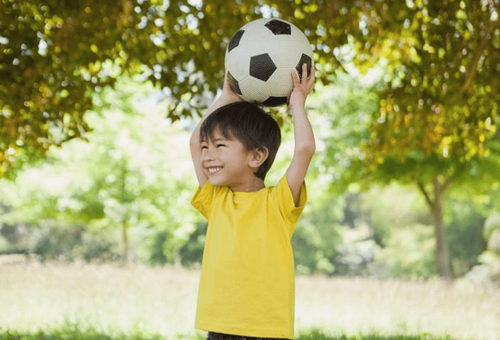This is an automatically translated article.
Self-awareness is an important skill for children with differences in learning and thinking. Children are self-aware of their strengths and weaknesses. This means that children know what they are good at and what they need to improve in order to be successful. A child with self-perception may admit that he or she needs extra time to study during the week when there is a spelling test at the weekend. Developing self-awareness in school can help your child succeed in school. This can also help your child learn to accommodate his needs as he gets older. In this article, we will provide useful information to help you know how to teach self-esteem to school-age children.1. Self-esteem in a child
Self-esteem is an awareness, a sense of self-worth - not related to specific talents or personality traits.Children with self-esteem:
Children are always confident in themselves. Children feel proud of what they can do. Children believe in themselves. Children always think positively. Children who feel good about themselves have the confidence to try new things. They are more likely to try their best. Children always feel proud of what they do. Self-esteem helps children cope with mistakes. It helps kids try again, even if they fail the first time. As a result, self-esteem helps children do better in school, at home and with friends, avoiding the problems that cause depression and autism at this age.
Children with low self-esteem:
Children are always self-critical and feel their own weakness. I always feel like I'm not as good as other kids. Think more about their failures than their successes. Lack of confidence, always shy. Feeling doubtful that you can't do a certain job well. Children with low self-esteem feel less confident about themselves, and are more likely to show signs of emotional disturbances or, more seriously, anxiety disorders. If your child thinks that others don't approve of him, he may not participate in all activities. Children can let others treat them badly without complaining. Children may also have difficulty standing up on their own. Or it can be easy to give up, or not try at all. Children with low self-esteem have a hard time coping when they make mistakes, lose, or fail. As a result, children may not be able to do things well when they are within their means.

Lòng tự trọng là sự nhận thức, ý thức về giá trị của bản thân
2. How to help children develop self-esteem
Self-esteem should be present from an early age. It develops slowly over time or forms when a child feels safe, loved, and accepted. Self-esteem can also form when a child receives positive attention and loving care from loved ones.As toddlers, they can do a number of things. Children become aware of their surroundings by using their new skills. Children's self-esteem will grow when parents pay attention, let them try, smile and show how proud you are of them.
As children get older, self-esteem also grows. Anything children do and learn is an opportunity to develop self-esteem. These include:
The child achieves the set goals. Children learn many things at school. Children make friends. Learn skills - music, sports, art, cooking, technology skills Get to practice favorite activities. When helping others. Praise for good work. Do things according to your child's interests. Children always feel understood and can share. Get rewards for your child's efforts and efforts.

Khi trẻ lớn hơn, lòng tự trọng cũng phát triển theo
3. Things parents can do to teach their children self-esteem
Every child is different. Self-esteem that comes easily to one child is difficult for another. Some children face possible low self-esteem. But even if that happens, you can still help your child regain her self-esteem. Here's what parents can do to help their kids:3.1. Give unconditional love
"My dear, no matter what, I still love you unconditionally." That is the message you always have to show your child. Your children benefit most when you accept them for who they are, whether they are good or bad, whatever their strengths and weaknesses, difficulties or failures, temperament or abilities.3.2. Listening carefully
Set your phone aside long enough for your child to know you're paying attention and answering his questions. Eye contact lets your child know that you are really listening to what he has to say. This is really important for your child's sense of self-worth because it shows them that you think they're important.When you are too busy, try to take some time so that you and your child can talk about what happens at school, at home, with friends or relatives. Everything is enough for the child to understand that you do not forget the child.
3.3. Help children learn how to do things
At each age, there is always something new for children to learn. Even in childhood, learning how to hold a cup or take your first steps sparks a feeling of excitement about learning new skills. As your child grows, things like learning to dress, read, or ride a bike are opportunities to develop self-esteem.3.4. Encourage healthy risk taking
When teaching your child how to do it, guide him/her at first and do it with him a few times. Then let them do what they can, even if they make mistakes. Make sure your child has the opportunity to learn, try, and feel proud. Don't make new challenges too easy - or too hard.
Đừng đặt những thử thách mới cho trẻ quá dễ - hoặc quá khó
3.5. Let failure happen
When doing anything, there is always the risk of failure. Teaching your kids how to deal with failure is what you need to do. For example, if your child can't learn to ride a bike, praise him for trying and encourage him to keep doing it instead of berating or scolding him. Constructive feedback and appreciation for a child's efforts can offset feelings of shame or failure he may be feeling, and this can help your child move forward feeling motivated. and more optimistic. With this approach, your child will begin to accept setbacks as a normal part of life and learning.3.6. Praise the efforts
Avoid focusing praise solely on results (such as getting a 10) or fixed qualities (such as intelligence).Instead, praise your efforts, progress, and attitude. For example: Thank your child for helping you with the housework, admit that you can't do well if your child doesn't help you. This will enhance a child's sense of self-worth while letting them know exactly what they did right. And with this kind of praise, children will put effort into everything, aim for the goal and try. When children do that, they are more likely to succeed.
3.7. Be a good role model
When you put effort into everyday tasks (like cleaning the house, cooking, taking care of the plants, doing the laundry or washing the car), you are setting a good example. Your child will learn to follow suit and make an effort to do their homework, clean up toys, or make the bed.When you do a task happily (or at least without nagging or complaining), you teach your child to do the same.
3.8. Empathy
If your child needs to talk, regulate his feelings and let him know that you understand and respect his point of view. Your child needs to know that his or her thoughts, feelings, desires, and opinions are all important to you.Accepting your child's feelings without judgment shows that you care about what he has to say. You can also share similar experiences from your own childhood to show your child that you understand how he or she is feeling right now.
3.9. Absolutely no comparison
It is human nature to always be dissatisfied with what you have, to always see other people's children as better than your own children in every way, but remember that all comparisons are meaningless and your child is an individual. unlike anyone else. The sayings "Why can't you study as well as friend A", "Why can't you be like friend B" is really a pressure on your child. That only causes children to harbor shame, envy, and jealousy.Instead, show your child your empathy by pointing out your child's strengths such as "Friend A is good at studying, but he may not be as good at drawing as you".
If the child falls into a negative spiral, he always feels incompetent and lacks confidence in being able to do anything. Help your child see things from a more realistic perspective, such as encouraging them to say, “I'm doing well in school, but I only have a little problem with Math. Now let's solve that problem together." Help your child realize that we all have strengths and weaknesses, and that they don't have to be perfect to feel good about themselves.
If you feel worried about your child's psychological effects leading to depression, see a psychologist for helpful advice.

So sánh con quá nhiều có thể khiến con rơi vào trầm cảm
3.10. Do not criticize harshly
The messages children hear about themselves from others easily translate into how they feel about themselves. Rough words: "I'm lazy!". Harmful, not motivating. When children hear negative messages about themselves, it damages their self-esteem. Please be patient with the child to correct, if the child makes a mistake next time, please do it again with the child.3.11. Always encouraging, encouraging
Encouragement is not the same as praise. For example: you praise your child when he draws a picture that "It's the best picture I've ever seen" can make him feel that he's good at everything and doesn't need much effort. satisfied with yourself. Instead, compliment: “Tell me about your painting, you must have spent a lot of time on it, it is very beautiful.”
Too much praise can lower self-esteem as it can create pressure to perform and place a constant need for approval from others. So consider praising cautiously and encouraging freely. This helps your child grow up and feel good about themselves.
3.12. Give your child the opportunity to help others
Self-esteem develops when children see that what they do matters to others. Children can help around the house, make a small project at school, or help out a sibling. These supportive actions help children build self-esteem and other positive emotions.At this age, children are very susceptible to psychological problems, so parents should talk to their children more and be closer to them. If the child has abnormal psychological symptoms, parents should take the child to see a psychologist immediately. Vinmec International General Hospital has a full team of trained psychologists and doctors. Children will receive a comprehensive psychological examination, early detection of psychological instability. The child will be psychologically treated according to a separate protocol.
If you have a need for psychological examination for children at Vinmec, please register directly at the website or contact the hotline system for detailed advice.
Please dial HOTLINE for more information or register for an appointment HERE. Download MyVinmec app to make appointments faster and to manage your bookings easily.
References: babycenter.com, understood.org, kidshealth.org












